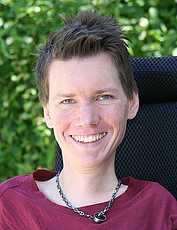Handsfree Coding
This website will be home to the "Handsfree Coding" initiative of the Junior Fellows. Please subscribe to the handsfree coding mailing list to receive updates!
Why Handsfree Coding?
Accessibility is often associated with structural changes or technical aids that are intended to make means of transport, events or everyday objects accessible to restricted user groups. But in computer science in particular, the development of accessible approaches often not only affects marginalized groups, but can also provide important impulses for the mainstream. Obvious examples of accessibility as a driver of innovation are technologies for the interpretation and synthesis of natural language, which for decades have enabled people with severely limited or no motor skills to interact with computers and their environment. Even if their use was only really practical in exceptional cases for a long time, they have now found their way into our everyday lives and are used on a daily basis by millions of people who dictate short messages on their smartphones more efficiently than typing them or prefer to ask a digital assistant for the weather rather than looking it up themselves.
But surprisingly, this trend is not materializing for the use of desktop devices, even though today's operating systems can already be controlled with built-in features via speech recognition and eye tracking: Accessible input methods on PCs are unknown to many laypeople and are often seen by experts only as technical gimmicks or makeshift devices whose use is inherently awkward. As a consequence, the use of these alternative input methods is neither taught in studies nor in training, which makes it more difficult for those interested to get started and at the same time further consolidates the prevailing preference for the exclusive use of mouse and keyboard.
We aim to create sustainable informational resources to promote Handsfree Coding for increased efficiency to the broad mass of developers, and thus to establish it in the computer science community.
Getting Started
- Talon(Win / Linux / Mac voice coding free of charge!):
- Wiki
- wav2etter (speech recognition engine)
- Starter grammars
- knausj_talon (English)
- mqnc/talon_german (German)
- Gaming with Talon
- Slack Community
- Patreon Support
Talks
- Wolfram Wingerath (2021). What You Say is What You Get: Handsfree Coding in 2021
- Emily Shea (2019). Voice Driven Development: Who needs a keyboard anyway?, Strange Loop (2019)
- Boudewijn Aasman (2018). Coding by Voice with Dragonfly, PyGotham (2018)
- David Williams-King (2016). Coding by Voice with Open Source Speech Recognition, The Eleventh Hope (2016)
Tavis Rudd (2013). Using Python to Code by Voice, PyCon US (2013)
Contact
Wolfram Wingerath, Data Engineer at Baqend |
Wolle did his PhD on real-time databases at the University of Hamburg in 2019 and now heads the data engineering team at Baqend where he is responsible for all matters related to data analysis and real-time data processing. Having used speech recognition tools for software development since 2011, Wolle has gathered one decade worth of experience in hands-free coding. Since Wolle is always keen to see new faces and because he likes to exchange ideas and experiences with others, he frequently speaks at developer and research conferences to present the things he cares about. wolle@baqend.com |


